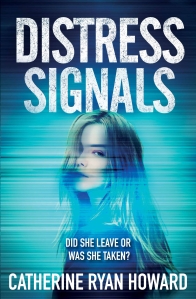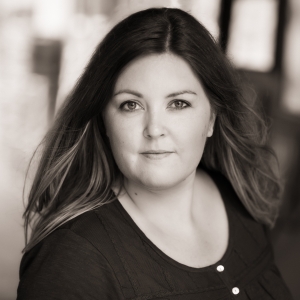Guest Post: Catherine Ryan Howard
 Catherine Ryan Howard’s nautical thriller Distress Signals, which came out yesterday, has been picking up all kinds of fabulous reviews.
Catherine Ryan Howard’s nautical thriller Distress Signals, which came out yesterday, has been picking up all kinds of fabulous reviews.
It’s about Adam Dunne’s investigation into the disappearance of his girlfriend Sarah. Adam, frantic with worry and dread, connects Sarah to a cruise ship called the Celebrate—and to a woman, Estelle, who disappeared from the same ship in eerily similar circumstances a year before. To get the answers, Adam must confront some difficult truths about his relationship with Sarah. He must do things of which he never thought himself capable. And he must try to outwit a predator who seems to have found the perfect hunting ground…
Distress Signals is literally a holiday page-turner. Adam’s hunt for Sarah throws up all kinds of questions about a place we would consider a safe space—a sunny cruise liner full of happy people. But, of course, the enclosed confines of a ship a long way from land is the perfect place for a murderer to make merry hell among people with their guard down…
Catherine, who is based in Dubin, has worked in the leisure industry, so she’s seen for herself the dark side of the holiday dream. In this amazing guest post—it’s one hell of an eye-opening read—she talks about how her experiences shaped Distress Signals, and about how camp sites, hotels, cruise liners and theme parks teem with potential danger…
I loved the years I spent working in hospitality, but it wasn’t all fun in the sun. In fact, it was almost never fun in the sun, at least not for – and that was the problem. In hotels and resorts, you work hard and you work long hours, but the guests and customers you interact with aren’t, for the most part, working at all. They’re all on holiday.
Back in 2005 I worked as a campsite courier on the Western Mediterranean coast of France. Each morning I would pull on my uniform – a fetching green shorts and red T-shirt combination that made me look like one of Santa’s elves only dressed for a warmer climate – and stumble out of my “live tent” (live as in I live here, not live music), heading for the shower block. The sky would be blue, the early morning sun warm and glorious and, en route, I’d pass family after family sitting on the decks of their mobile homes, sipping coffee and pulling apart flaky croissants fresh from the campsite’s bakery.

On my way back, I’d pass these same families heading for the pool or the beach, lugging inflatables, towels and parasols. Ahead of me was typically five or six hours of cleaning the mobile homes and tents that had been vacated that day (in thirty-degree heat), and then another four or five hours of checking new customers into them after that. It could be depressing.
There was a darker side to being “on site” too. I’d been on numerous self-drive/campsite holidays in France growing up, both with the brand I now found myself working for and others, and I’d always loved them. The adventure of the mobile home or tent; the freedom to roam around the campsite; the fun hours spent at the swimming pool or in the playground or at the Kids’ Club. As a courier, my perspective was very different. The tents we lived in were dirty and broken, as was the “live area” in which they’d been erected. (Scabies was a known scourge on several sites.) As an aspiring crime writer, I always did what I called my Serial Killer Check whenever I stayed somewhere new: I counted how many locked doors a potential serial killer would have between him and me while I slept. On that campsite there were no doors at all, only zips. Anyone could come into or go out of your tent in the night.
Couriers frequently got themselves into trouble: taken to hospital in an ambulance with alcohol poisoning, or to the police station in a squad car because they’d been caught attempting to abscond with the petty cash box. Most were hired straight out of school and had never been away from home before. They barely knew how to look after themselves, let alone the customers.
I don’t think our customers appreciated that if something happened on their holiday, they were dependent on a motley crew of couriers, typically aged from 17 to 22, who didn’t speak the local language. During my stint there was a biblical storm which sent trees crashing into the roofs of the tents and flooded most of the campsite. Customers packed up their cars and fled during the night.
This was before wi-fi was everywhere and phones got smart; as the campsite was out in the middle of nowhere, we were so isolated we may as well have been on the moon. I remember one day catching sight of the cover of a British tabloid newspaper a customer had brought with them. There was a picture on the front taken outside the Superdome in New Orleans which showed a dead body floating in a flooded street. I was so confused. Bodies in the streets of a major U.S. city? What was happening out there in the world?
I hadn’t spent much time staying in hotels when, not long after my stint on the campsite, I moved to Orlando to work in one with more than 2,000 rooms in Walt Disney World. Here, the staff/guest divide was worse than ever. I’d come on shift at the front desk mid-afternoon, facing eight hours of standing in heels and practicing “aggressive friendliness” (Disney’s preferred employee manner), to greet families who’d been saving for years and years and were now fizzing with the excitement of finally being on their dream vacation. It was hard not to catch their enthusiasm. I almost always did.
But even in the happiest place on earth, darkness falls. One morning a huge team of us cast members (employees in Disney-Speak) were assembled to do a safety check: to knock on every single door in the hotel. In the early hours of the morning, a woman had called security in despair, saying she had hurt her children. As the call was made from a mobile phone, the room number couldn’t be traced. Now, we were trying to find her. If I got no answer to my knock I had to let myself into the room with a master key, bracing myself for what I might find. After several hours of this, we found nothing. It seemed like the call had been a prank.
On another occasion, we at the front desk noticed that someone had left a bag behind in the lobby. When we went to pick it up, we saw a handgun – a loaded handgun, it turned out – sitting inside. Even if you have a license to carry one, personal firearms are not allowed on WDW property. A major security alert ensued, and we eventually identified our very apologetic (and evidently forgetful) gun-toting guest.
Our training also including numerous doomsday scenarios, what with WDW being one of the biggest terrorist targets in the United States. September 11 th 2001 was the only day since it opened in 1971 that WDW closed its gates, hand-holding employees forming a human wall that gently herded guests out of the parks while air force jets flew overhead. The cast members were told not to tell guests why unless they asked directly. What a disconcerting event that must have been, especially when you consider that there wasn’t the instant access to real-time events, e.g. Twitter and Facebook, that we have in our pockets today.
More generally, hotels are often the site of events the average guest would rather not think about. They’re a popular location for suicides, for instance. Housekeepers are trained to close and lock guest room doors behind them as they work – there have been numerous incidents of violent and sexual assaults on housekeepers by guests or other passers-by who happened to see them working in a room, went in and closed the door behind them, leaving only the housekeeper’s master key registered in the lock’s activity. As a housekeeping inspector, I also had to have hepatitis shots and special biohazard training in order to deal with “protein spills” – more Disney-speak. These ranged from a pool of not-quite-digested clam chowder in a bed to a streak of human faeces leading from the door of a guest room all the way down the hall to the elevator bank. (A wheelchair-user had unwittingly wheeled through it.)
People also hide in hotels – from authorities, from abusive spouses, or just from their lives. In one memorable incident I checked in a guest dressed like a character from a Jackie Collins novel, all coiffed and tucked and glossed, who refused to take off her sunglasses and only spoke in a hushed whisper while casting furtive glances over her shoulder. ‘I don’t want anyone to know I’m here,’ she told me. ‘Don’t give out my name, or put through calls to my room, or anything like that.’ No problem, I said. What’s the name on the reservation? ‘Marilyn Monroe.’ Um, okay… Perhaps not the best choice of fake name when you’re trying not to draw attention to yourself?
Hotels can be the site of all sorts of weird and unnerving activity. I myself have stayed in a haunted hotel room here in Dublin, and one of the strangest stories I ever heard was the tragic case of 21-year-old Elisa Lam, found drowned in a water tank on the roof of the Cecil Hotel in Los Angeles back in 2013. CCTV footage from inside one of the hotel’s elevators is the last trace of Lam alive, and it shows her behaving very oddly, darting in and out as if hiding from someone unseen in the corridor. Moreover, her body lay in the tank for a fortnight and was only discovered after guests complained about the strange colour of water coming out of their sink taps and shower heads. Her death is still unexplained.
Although I’ve never worked on a cruise ship, I drew on these experiences in the hospitality industry – as a campsite courier, a front desk agent and a housekeeper supervisor – to lend some authenticity to Distress Signals, my debut thriller that explores the dark side of these colossal floating hotels and the idea that there are, effectively, no police at sea. Because if you think campsites and hotels are bad…
Well, just wait until you board the Celebrate. She’s waiting for you.
***
Distress Signals, by Catherine Ryan Howard, is out now, published by Corvus in paperback and ebook.

